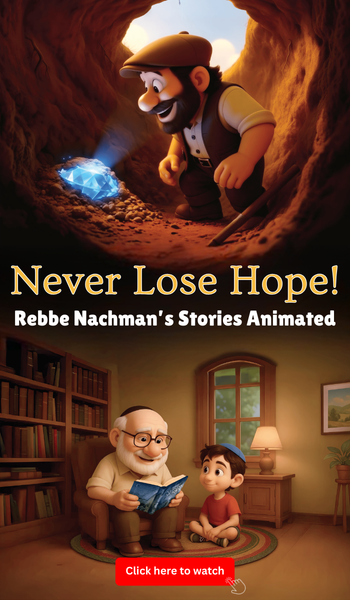THE GOOD POINTS – AZAMRA!
Know! you must judge all people favorably. Even in the case of a complete sinner, you must search until you find some good in him!
Judge everybody favorably! (Avot 1:6). This promotes peace (Rashi).
One who judges others favorably, is himself judged favorably (Shabbat 127b).
God’s way is to focus on the good. Even if there are things which are not so good, He only looks for the good. How much more do we have to avoid focusing on the faults of our friends. We are obligated to seek only the good – always! (Likutey Moharan II, 17).
* * *
Rebbe Nachman teaches: Know! you must judge all people favorably. Even in the case of a complete sinner, you must search until you find some good in him, some small aspect in which he is not a sinner. Buy doing this, you actually elevate him to the side of merit. You can then bring him to return to God. This can be understood from the verse, “In but a little bit the sinner is not; search carefully his place and he is not there” (Psalms 37:10). If you find but a little bit of good, then the sinner is not – he is no longer guilty; search his place and he is not there – but is now to be found on the side of merit (Likutey Moharan I, 282).
So begins Rebbe Nachman’s lesson AZAMRA! Conceivably the most important lesson in all of Likutey Moharan, it is the only one which carries the Rebbe’s exhortation: “Go with this lesson, constantly!” Keep it in mind and practice it, always! (The publication AZAMRA! contains the entire lesson and Reb Noson’s commentary in translation, explaining these concepts at length.) Why is the message of this lesson so special?
“…If you find but a little bit of good, then the sinner is not – he is no longer guilty; search his place and he is not there – but is now to be found on the side of merit!” (Likutey Moharan I, 282).
The faculty of judgement is one of man’s most powerful tools. If we really knew just how potent, we would certainly be more careful about how we used it. Elsewhere, the Rebbe teaches that judging others can destroy the world. If a person finds fault with another, this judgment can condemn him (Likutey Moharan I, 3). Think about it! your evaluation, your opinion and judgement of others has the power to either elevate or degrade.
The problem is that criticism comes easy. Too easy. We can always find fault in what others do or fail to do. It’s not difficult to ascribe ulterior motives even for the worthiest of deeds. This is especially true when we hear slander. Then everyone is quick to jump on the bandwagon condemning the offender for his wrongdoing. We have to realize that every word spoken about another person is, in some way, a form of judgment. If, in our judgment, we find the good points and focus on the positive, we can bring the world – the entire world – to the side of merit and worthiness. However, the reverse is also true. In judging others, if we find fault and focus on the negative, we can bring the world – the entire world – to the side of demerit and unworthiness. This is why we must always try to look for the good in others, even in the worst person we know. Such emphasis on his positive traits affects him, because, as Rebbe Nachman said, our favorable judgment “actually elevates him to the side of merit.”

The faculty of judgement is one of man’s most powerful tools!
After Reb Noson published his Likutey Tefilot (translated as: The 50th Gate; Reb Noson’s Prayers), his followers suggested that he should be known as the Master of Prayer (after the main character of the 12th story in Rabbi Nachman’s Stories, entitled “The Master of Prayer.”) Reb Noson replied, “The Master of Prayer is Rebbe Nachman. If I am to be considered as one of the King’s men, I am the Bard, the singer of praises. This is because I can even find merit in a person who transgressed the entire Torah 800 times!” (Siach Sarfei Kodesh I-591).
(taken from the book: Crossing the Narrow Bridge: A Practical Guide to Rebbe Nachman’s Teachings; chapter 3: The Good Points pp. 36-38).
- 0 comment






















